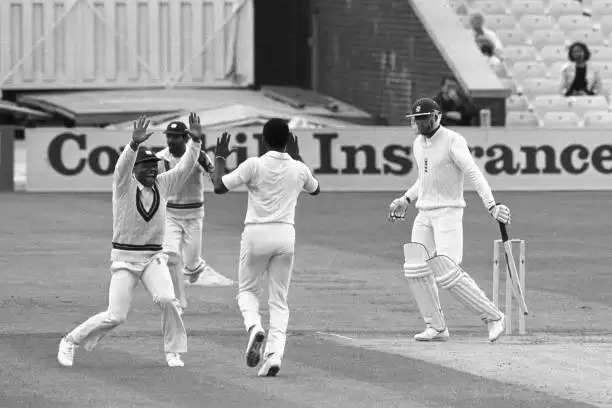The same old, Old Trafford!

After winning the opener against England, it was widely expected that West Indies would dominate the second Test at Old Trafford. The thought strengthened when skipper Jason Holder, looking to exploit the bowler-friendly conditions, opted to bowl. Instead, it was the hosts who outclassed the visitors by posting a mammoth first innings score of 469-9 in two days, thanks to centuries from Dominic Sibley (120) and Ben Stokes (176).
On day two, Windies came in to bat with the prime challenge of playing out the remaining overs. The third day’s play was supposed to resume at West Indies 32-1, still 437 runs behind, but due to the incessant rain, not a single ball was bowled.
For now, looking at the situation, a draw or an England win, could be the results most would predict. Have they thought of considering that all three results possible?

West Indies taking an unassailable lead of 2-0 and winning the Wisden Trophy series in England can be a possibility, only if they play like the way they did 32 years ago.
Let us go back in time.
It was 1988. After a draw at Trent Bridge, West Indies won the Lord’s Test by 134 runs and were 1-0 up in the five Test series. The third Test was at the Old Trafford. The sun stayed away, and the conditions remained overcast throughout, much like now. But then, England were down, not West Indies.
England batted first. They were bundled out for a mere 135 in a day by a bowling attack which was mostly inexperienced other than Malcom Marshall. The other pace bowlers had not played more than 30 Tests. Courtney Walsh bagged four wickets, while Curtly Ambrose, Winston Benjamin and Marshall took two wickets each. In reply, the West Indies scored 384/7 declared – 249 runs ahead.
ALSO READ: THE BEN STOKES ENGLAND SEE
What was to follow was a great English debacle because of a magnificent fast bowling exhibition by the West Indians. Four slips and a gully put daunting pressure as the fielders, in catching position, waited for the edges. There was a silly point and a short leg too. Ambrose hit the deck and generated pace and disconcerting bounce that seemed unplayable; Walsh was on song too, after taking four wickets in the first innings; and Marshall swung the ball in and out with great accuracy. No wonder he was ranked the No.1 bowler then.
The first ball from Marshall beat both Graham Gooch, the batsman and Jeff Dujon, the wicket-keeper, for it came a long way in. Soon, Nigel Plews’ index finger pointed to the cloudy sky, as the experienced fast bowler had trapped Gooch lbw. His partner, Martyn Moxon got a life as Richie Richardson dropped him in the slips off Ambrose, but the right-hander soon fell to Benjamin edging it to skipper Vivian Richards, again in the slips. Marshall did not stop. Very soon, he found an outside edge off Mike Gatting’s blade, this time Richardson did not make any mistake. Again, off Ambrose’s bowling a catch was spilled, David Gower survived. And at close of play on day four, England found themselves in trouble after losing three wickets for 60 runs.
Upon a fall of wicket, when the West Indies players tapped on Marshall’s back or shook hands to congratulate, tall Walsh, stretched his hand up for a high-five, poor Marshall had to jump to reach his partner’s palm. They were clearly enjoying bowling their rivals out.
Later on, air, Richie Benaud said, “England looking right down the barrel and hoping, I think, for inclement weather.” It needs no mention which team today would be praying for a weather intervention.
Come last day of the Test, England collapsed from 73-4 to 93 all out, with only two batsmen achieving double figures. Ambrose took two, and the 30-year-old Marshall added another five wickets to his tally, to register his best bowling figures in Test cricket: 7/22!
England were decimated; their edges flew to the slips and their wickets went cartwheeling. After England lost the five-match series 4-0, Wisden commented,
“The morale and reputation of English cricket has seldom been as severely bruised as it was during the 1988 Cornhill Insurance Test series against West Indies.”
In that series, four England captains were appointed. Gatting for the first Test, John Emburey for the next two, Chris Cowdrey for the fourth followed by Gooch for the final one. It was a disastrous summer indeed for the English.
Come to the present day, the West Indies must thank the rain twice: first, for staying away in 1988 and helping them gain 2-0 lead and secondly for appearing in 2020, which might help them retain the series.
Ah! The same old, Old Trafford!

